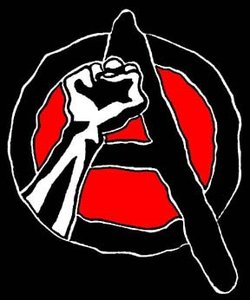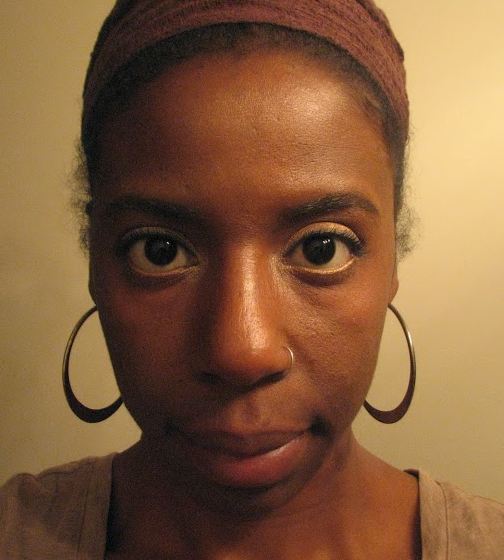 (Or, I hope it is because we are all recovering hierarchists trying to find another way forward) Editor’s Note: This piece is part two of a series of call and response between Amaryah Armstrong and Nekeisha Alexis-Baker as they consider what possibilities Christian anarchy can provide for marginalized peoples. The conversation grows out of friendship and mutual respect for each other, and from our commitments to living lives of liberation. We aim for to be an ongoing dialogue that builds on each call and response. As a result, we strongly encourage you to begin at the beginning and follow along from there. You can read part one from Amaryah here. Many things came to mind as I reflected on your questions—some of which I still ask myself almost a decade after unwittingly co-creating this thing we call Jesus Radicals. I had to smile at the “Black Queer Feminist with anarchist impulses” identity you’ve adopted because it reminded me of when I called myself “a Christian with anarchist tendencies” as I sorted out whether anarchism was for me. Which brings me to my first response. What I value most about anarchism is the integrative and intersectional possibilities the analysis offers. Understood most basically as resistance to hierarchy and domination, and as a method of organizing ourselves that values justice and mutual sharing of power, anarchism holds together for me what are often disparate movements that don’t always speak to one another (despite having myriad similarities at their roots). I’ve seen anti-war activists who aren’t anti-capitalist; anti-capitalists who aren’t feminist; feminists who aren’t anti-racist; anti-racists who are heterosexist; anti-heterosexists who are speciesist; anti-speciesists who still laud the state; and anti-statists who don’t question civilization, even though I see all of these are forms of oppression as closely related. Anarchism, on the other hand, “seeks to challenge domination at all levels of the social order”1 and “encourages us to see struggles as interconnected, and to act appropriately by building alliances and solidarity between them.”2 That, I think, is its great potential. Done rightly, anarchism involves all of the analyses mentioned above, in addition to being consensus-building, justice-building, community-building, liberation-seeking, personalist, mutually-aiding, direct acting, and interested in constructing alternative relationships and systems that are life-giving and -affirming. That many anarchists, Christian and otherwise, on this site and elsewhere, do not always knit these various critiques together—that we often focus on one part of the web while ignoring others—seems to me to be shortsightedness on our part rather than a shortcoming within the political theory itself. Anarchism, at its core, should embrace these various critiques and practices, not as an addendums, but because they each reflect a part of what being “against archy” is supposed to be about. I came to see the value in anarchism while reevaluating what it means to be Christian, which is why I see it as part of living out my faith. And yet, I don’t call myself a “Christian anarchist.” Personally, I see key tensions between that make me hesitate to join them into a Brangelina-esque “squish name” like that one. Instead, I am a Christian who is anarchist or a Christian-comma-anarchist. I see overlaps between the two, but they are distinct entities that argue at times, even as they bring out the best in each other—and I prefer to acknowledge that in my naming. Nevertheless, it was rediscovering Jesus and the fullness of his mission, starting with an introduction to the Sermon on the Mount that led me to seriously consider integrating anarchism into my identity. Seeing Jesus as one of the oppressed; as refugee from birth; as one who engaged the powers in ways neither his followers nor his detractors expected; as one who lauded the peacemakers; who upset social, religious and political norms and got himself killed (and raised from the dead) in the process—seeing that Jesus made me wonder if being an anti-war race-conscious Democrat was enough. As my conversation with anarchism and Christianity continued, it was white dudes like Jacques Ellul and John Howard Yoder that first helped me uncover the implications of 1 Samuel 8, of Jesus’ temptations and crucifixion, of the new community in Acts, of the critiques of hierarchical power throughout the biblical text. During that time, non-anarchist and other-than-Christian writers and speakers were also enriching my ongoing thinking—people like the anarchist Black panther who came to our first conference, the professors and the authors I read in my college Africana studies program, and the womanist and feminist theologians, and animal rights advocates I encountered in seminary. Today, other voices continue to deepen my understanding of anarchism and Christianity in the areas of sexuality especially. The “recovery” continues. As you rightly notice, however, the site does not reflect this diversity and this is a problem that requires both confession and explanation. When my spouse/fellow co-founder Andy and I were the only ones running the site, he was the one who had time and energy to develop the content. And he did so by 1) drawing on resources and thinkers that were formative for him at that time; 2) emphasizing Christian critique of the state and violence since nationalism and war-making remain pervasive sins among churches in America; and 3) creating a comprehensive library of major anarchist and Christian thinker Ellul. So those sections are literally one white heterosexual man’s perspective, with input from me and one or two others as time allowed, rather than even the tip of the iceberg of what this conversation offers. 3 Since that time our thinking has expanded, our partnership has extended to others, and our emphasis has widened—but that section has not been significantly updated, even though each of the organizers knows it needs to be. It is, for all intents and purposes, a frozen section in large part because our energy and our time remain stretched and limited. That said, if we ever get the time to “add more stuff”—or, better yet, if people out there would take a less consumerist approach to the site4—I think another rubric is still needed. This is a budding thought here, but instead of highlighting resources from “Christian anarchists,” perhaps a more inclusive method would be to collect resources from people that reflect the spirit and intent of anarchism, whether or not its authors identify themselves as such (something that I hope we are accomplishing through the Iconocast), and to list resources from writers and speakers that are anarchist who can deepen the radical Christian conversation, even if the authors themselves do not hold that faith commitment. I think making a move like that could better reflect the breadth of voices on both sides of these movements, voices which include anarchist people of color from around the globe and people from various perspectives who challenge Christians to go beyond “can’t we all just get along” 101. I welcome your feedback on this idea since it only started percolating as a possible solution in light of your piece. Finally, I just want to affirm your observations about anarcho-primitivism. As I’ve said in other places, the very name itself strikes me as problematic in that it feels inhospitable to the very people for whom “being primitive” has been the justification for their exploitation and colonization, and it actually is a negative word civilization gave to those “others” that they repressed. Although the aims of the movement are to learn from and affirm the practices of pre-civilized people from much earlier in the human record, and to use those insights as a means to critique the madness we live in now, I’ve tried to be both respectful and honest about my reservations. Since I am much less committed to it than others though, I think it is only fair to let those for whom the thought has been transformative respond to your questions (if they haven’t already by the time this piece is posted). So this is my response to your first call. Does it increase those anarchist impulses or squelch them? Does it shine some light on anarchism’s potential to be more than a “radicalizing space for white folks to organize under” or raise more questions about its usefulness? Looking forward to another call as we dialogue together. Notes:
|
Disclaimer
The viewpoints expressed in each reader-submitted article are the authors own, and not an “official Jesus Radicals” position. For more on our editorial policies, visit our submissions page. If you want to contact an author or you have questions, suggestions, or concerns, please contact us. CategoriesAll Accountability Advent Anarchism Animal Liberation Anthropocentrism Appropriation Biblical Exegesis Book Reviews Bread Capitalism Catholic Worker Christmas Civilization Community Complicity Confessing Cultural Hegemony Decolonization Direct Action Easter Economics Feminism Heteropatriarchy Immigration Imperialism Intersectionality Jesus Justice Lent Liberation Theology Love Mutual Liberation Nation-state Nonviolence Occupy Othering Pacifisim Peace Pedagogies Of Liberation Police Privilege Property Queer Racism Resistance Resurrection Sexuality Solidarity Speciesism Spiritual Practices Technology Temptation Veganism Violence War What We're Reading On . . . White Supremacy Zionism ContributorsNekeisha Alayna Alexis
Amaryah Armstrong Autumn Brown HH Brownsmith Jarrod Cochran Chelsea Collonge Keith Hebden Ric Hudgens Liza Minno Bloom Jocelyn Perry Eda Ruhiye Uca Joanna Shenk Nichola Torbett Mark VanSteenwyk Gregory Williams Archives
October 2017
|
Search by typing & pressing enter


 RSS Feed
RSS Feed